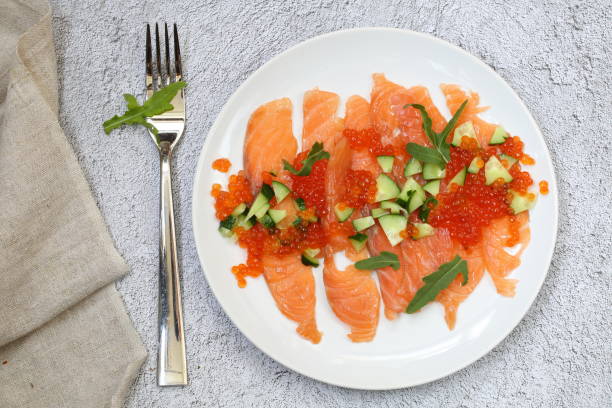We have Hugh Sinclair to thank for one of the world’s tastiest health secrets
The British biochemist recognized in 1944 that Greenland’s natives had hardly any cardiovascular diseases. He suspected the reason to be a diet rich in fish. In fact, we now know that it is mainly the omega-3 fatty acids in salmon. They clean the blood vessels, protect against blood clots, and improve cholesterol levels. Experts advise eating fish twice a week. 15 g of salmon covers the daily requirement of 500 mg of omega-3 fatty acids.
Not only the heart smiles with salmon
It contains vitamins B 12 and D, potassium, zinc, and iodine and is ideal for diets (see the cherry diet in the extra issue of this issue): the protein it contains increases fat burning, and supplies tyrosine, which the body converts to the slimming agent’s dopamine and noradrenaline rebuilt.
The best-selling salmon is the Atlantic salmon from the Baltic Sea and North Atlantic, weighing up to 36 kilos
However, more than 90 percent of the Atlantic salmon sold by us comes from farms in Ireland, Norway, and Scotland, because wild salmon has become rare due to dams, overfishing, and water pollution and has therefore become expensive.
You can hardly tell the difference between farmed and wild salmon, especially the color of the meat
It occurs in wild salmon by eating crabs and shrimp and their red shells. Farm salmon gets artificial color pigments in the feed.
Real wild salmon has its price because it is rare, its flesh is firmer, more aromatic, and less fat than that of farmed salmon
Therefore, if “wild salmon” is written on inexpensive products, skepticism is appropriate. Be careful with terms like “wild-water salmon”, “real Atlantic salmon” or “fjord salmon”. They only state that the breeding farm is located in the open “wild” Atlantic or in Norwegian fjords. Tip: If you want to save wild salmon and your wallet, buy or order from Bioverband Naturland e. V. or Deutscher See certified salmon products without growth promoters or medication (e.g. via www.premiumlachs.de or www.wechsler-feinfisch.de).
The sushi boom has made salmon even more popular
If you like to prepare sushi yourself, only use fresh fish! You can recognize it by its smell because fresh fish does not “fish” but only smells slightly of the sea, salt water, or seaweed.
Fresh salmon is often hard to come by in southern Germany
Then reach for frozen fish. It is no worse than fresh produce, it is shock-frozen and packaged while it is still “harvest” fresh at sea, while fresh produce often takes several days to reach the customer. Fresh fish only lasts two days in the refrigerator, and frozen fish up to five months in the freezer.
Raw salmon keeps for a week if marinated in a sweet and salty dill mixture
“Gravad salmon” is the name of this Scandinavian specialty, which is easy to make yourself with 6 tablespoons of salt, 2 tablespoons of sugar, plenty of dills, and black pepper per kilo of fish. To do this, cut the fillets with skin into postcard-sized pieces, mix sugar with salt and rub the meat sides with it. Then you alternate layers of sugar salt and salmon with dill and pepper, leave everything to stand for 2-3 days, scrape off the spices and herbs and cut the salmon wafer-thin.
Longer shelf life: packaged smoked salmon from the refrigerated section (at least two weeks)
Because this salmon has usually already been deep-frozen, it is as sensitive to microbes as minced meat. It should be eaten as soon as possible, immediately after opening. Pregnant women should avoid sushi and smoked salmon for 9 months. There is no risk with overcooked salmon.
Leave the skin on when frying
It protects the meat and retains the aroma. Your salmon fillet will be light and delicious if you wrap it in aluminum foil with herbs (e.g. rosemary, thyme), salt, pepper, a little olive oil, and lemon juice and steam it in the oven at 180 degrees for 20 minutes.



